U.S. Supreme Court puts hold on vaccine mandate for large employers, allows mandate for health facilities to operate
 On Thursday afternoon, the U.S. Supreme Court halted the Biden administration’s vaccine mandate for employers with more than 100 people but left in place the one for federally funded health facilities.
On Thursday afternoon, the U.S. Supreme Court halted the Biden administration’s vaccine mandate for employers with more than 100 people but left in place the one for federally funded health facilities.
Below is an analysis from the firm of Cohl, Stoker & Toskey, P.C. on what this means for county entities going forward:
“On Jan. 13, 2022, the U.S. Supreme Court issued opinions on both the CMS Vaccine Mandate, and the OSHA Emergency Temporary Standard. The opinions were issued less than one week after the Court held oral arguments on Jan. 7. 2022.
“(1) In a 5-4 decision, the Court granted the Federal government’s emergency applications to stay the Missouri and Louisiana District Court injunctions judicially enjoining the CMS vaccine mandate in 25 states. Therefore, CMS may now enforce the mandate nationwide, including in Michigan. The validity of the mandate will be determined in further proceedings in the lower Courts.
“(2) In a 6-3 decision, the Court granted the challengers’ emergency applications to re-impose the stay of the OSHA Emergency Temporary Standard vaccine/testing mandate that had been dissolved by the Sixth Circuit in a 2-1 decision on Dec. 17, 2021. Therefore, the OSHA ETS may not be enforced pending the outcome of litigation in the lower courts.
“As to the CMS Vaccine Mandate, facilities subject to the mandate must:
“(1) comply with Phase 1 of the CMS mandate, i.e., staff at all health care facilities included within the regulation must have received, at a minimum, the first dose of a primary series or a single dose COVID-19 vaccine prior to staff providing any care, treatment or other services for the facility or its patients, by Jan. 27, 2022; and
“(2) comply with Phase 2 of the CMS mandate, i.e., staff at all health care provider and supplier types included in the regulation must complete the primary vaccination series or have obtained an exemption, by Feb. 28, 2022.”
Counties, of course, should consult with their own counsel on any issues specific to their situation. MAC will provide additional updates as litigation continues.
U.S. Treasury, Mich. Treasury, NACo release analyses on SLFRF Final Rule
 Following the release last week of the federal Final Rule on State and Local Fiscal Recovery Fund, federal, state and National Association of Counties experts have been providing overviews and analyses of key points for local leaders. MAC strongly encourages county officials to carefully study all these resources in the coming days.
Following the release last week of the federal Final Rule on State and Local Fiscal Recovery Fund, federal, state and National Association of Counties experts have been providing overviews and analyses of key points for local leaders. MAC strongly encourages county officials to carefully study all these resources in the coming days.
The Final Rule takes effect on April 1, 2022, though U.S. Treasury officials noted that funds used under the interim final rule will be considered in compliance with the Final Rule.
Among key new components in the Final Rule are:
- The $10 million revenue loss standard allowance, rather than completing full revenue loss calculation, is for the total period of the program and not on an annual basis
- Eligible uses have been broadened – capital expenditures allowable (affordable housing, hospitals)
- The option to provide premium pay has been streamlined
- Investments for water and sewer and broadband have been expanded
The U.S. Treasury has provided:
- An Overview of the Final Rule, a 44-page document
- a Project and Expenditure Report User Guide, an 89-page document
- MAC staffers compiled a set of bullet points taken from a U.S. Treasury webinar on Monday
NACo has provided/is providing:
- An overview of the Final Rule
- Webinar for members (recording)
- Jan. 18 webinar on revenue loss issues (click link to register)
- Jan. 20 webinar on broadband issues (click link to register)
A state analysis of the Final Rule and other documents can be found on the Michigan Treasury’s COVID page for local governments.
MAC strongly encourages county officials to consult these resources as soon as possible.
For the latest news on this issue, visit the MAC website.
Sign up now for Jan. 25 finance webinar co-sponsored by MAC
 The 15th Updates and Resources for Local Governments” led by the Michigan Treasury, and co-sponsored by MAC and other local government groups, will be on Jan. 25 from 2 p.m. to 3 p.m.
The 15th Updates and Resources for Local Governments” led by the Michigan Treasury, and co-sponsored by MAC and other local government groups, will be on Jan. 25 from 2 p.m. to 3 p.m.
Topics covered will include:
- An update on the the Michigan Consensus Revenue Estimating Conference held Jan. 14, 2022
- An update from MEDC on the Revitalization and Placemaking (RAP) Program
Participants can register and submit questions on the webinar’s registration page.
Additionally, the Michigan Department of Treasury has developed a webpage with numbered letters, memorandums, webinars, and resources regarding COVID-19 updates for local governments and school districts.
This webpage was created to ensure that Michigan communities have access to the most up-to-date guidance and is updated frequently with information and resources as they become available. A recording of the webinar will be posted on the page after the event.
Governor creates Office of Rural Development
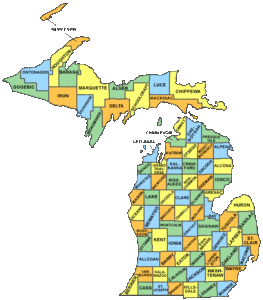 A new state office will focus on the “economic, social, and educational needs in rural areas” under an order by Gov. Gretchen Whitmer.
A new state office will focus on the “economic, social, and educational needs in rural areas” under an order by Gov. Gretchen Whitmer.
The Office of Rural Development will be housed in the Michigan Department of Agriculture and Rural Development (MDARD) and serve as a crucial component for rural communities seeking resources and opportunities.
The office will:
- Collaborate with the Michigan Economic Development Corporation and other stakeholders on rural economic development
- Collaborate with the Michigan State Housing Development Authority to facilitate rural affordable housing development
- Promote sustainability, environmental preservation, and green energy development
- Address the ramifications of population and demographic trends in rural Michigan
- Analyze and provide guidance on education-related issues affecting rural communities
- Collaborate with the Michigan High-Speed Internet Office to facilitate expansion of high-speed internet connection in rural communities
The creation of the Office for Rural Development will build a better connected and more prosperous rural Michigan. MAC looks forward to working with the office to serve rural communities statewide. See additional details here.
For more information, contact Deena Bosworth at bosworth@micounties.org.
Sen. Stabenow to lead infrastructure meetings with local leaders
 U.S. Sen. Debbie Stabenow (D-Mich.) will host a series of virtual sessions with local leaders in January to update them on federal infrastructure funding opportunities for your community.
U.S. Sen. Debbie Stabenow (D-Mich.) will host a series of virtual sessions with local leaders in January to update them on federal infrastructure funding opportunities for your community.
“After decades of inaction and through all the challenges of COVID, we passed historic federal legislation last year to fix our nation’s crumbling infrastructure. Early in 2021, we passed the American Rescue Plan that not only stabilized our economy but provided significant new resources to local governments,” Stabenow said in a statement. “As a former local elected official, I know how critically important it is to be able to plan ahead.”
West Michigan Regional Meeting
Jan. 19, 10 a.m.
Each individual must register to participate here.
Northern Michigan & Upper Peninsula Regional Meeting
Jan. 19, 1 p.m.
Each individual must register to participate here.
Genesee/Great Lakes Bay/Thumb Regional Meeting
Jan. 20, 10 a.m.
Each individual must register to participate here.
Southeast Michigan Regional Meeting
Jan. 20, 1 p.m.
Each individual must register to participate here.
Mid-Michigan Regional Meeting
Fri, Jan 21, 10:30 am
Each individual must register to participate here.
Please note: Each person must individually register to participate. You are welcome to share the registration link with other leaders and stakeholders you feel would be interested in the meeting. Local members of the press are invited to attend the meetings. You are welcome to submit questions when you register, or you may ask questions or submit comments via Zoom chat during the meeting. If you have any technical issues or questions regarding the registration process, email RSVP@stabenow.senate.gov.
State Infrastructure Office will coordinate new federal aid
 A Michigan Infrastructure Office announced by Gov. Gretchen Whitmer this week will focus on utilizing resources coming to the state from the federal Infrastructure Investment and Jobs Act.
A Michigan Infrastructure Office announced by Gov. Gretchen Whitmer this week will focus on utilizing resources coming to the state from the federal Infrastructure Investment and Jobs Act.
The office will be responsible for ‘coordinating across state government and partnering with local officials, federal partners and stakeholders to invest in Michigan’s infrastructure.” By establishing this office, the state will ensure these once in lifetime resources are used effectively to repair roads and bridges, replace lead pipes, expand high-speed internet and build up electric vehicle infrastructure.
The Michigan Infrastructure Office will allow the state to move ahead and invest in communities to improve our ailing infrastructure. MAC looks forward to working with the office to build a more modernized future.
For more information, contact Deena Bosworth at bosworth@micounties.org.
 MAC offices closed on Monday, Jan. 17
MAC offices closed on Monday, Jan. 17
MAC’s Lansing offices will be closed on Monday, Jan. 17 to observe Martin Luther King, Jr. Day.
Normal offices hours will resume on Tuesday, Jan. 18 at 8 a.m.
Check these links for activities in your area to honor and celebrate the civil rights leader:
 Staff picks
Staff picks
- How states and localities can use data to spend federal funds wisely (RouteFifty)
- Bugs, shorter winters, climate: Great Lakes vineyards face changing circumstances (GreatLakesNow)
- Here’s who had the most liquor sales in Michigan’s 83 counties (MLive)
- Pa. county needs millions to prevent 911 radio hijacking (Governing)

 The deadline for eligible local governments to voluntarily participate in two historic opioid settlements has been extended to Jan. 26, Michigan Attorney General Dana Nessel’s office announced this week.
The deadline for eligible local governments to voluntarily participate in two historic opioid settlements has been extended to Jan. 26, Michigan Attorney General Dana Nessel’s office announced this week. Public meetings in Michigan governed by the state’s Open Meetings Act (OMA) are now under more restrictive rules on remote participation, as of Jan. 1, 2022. This means that commissioners cannot participate in a county board session as a voting member via electronic means, with only one narrow exception.
Public meetings in Michigan governed by the state’s Open Meetings Act (OMA) are now under more restrictive rules on remote participation, as of Jan. 1, 2022. This means that commissioners cannot participate in a county board session as a voting member via electronic means, with only one narrow exception.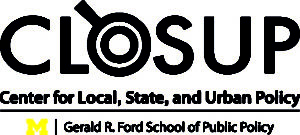 A University of Michigan webinar on Jan. 19, “
A University of Michigan webinar on Jan. 19, “ Final chance to speak on health IT needs is Jan. 26
Final chance to speak on health IT needs is Jan. 26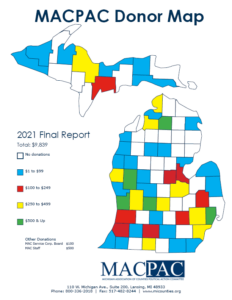 MACPAC raises almost $10,000 in 2021 from nearly 90 donors
MACPAC raises almost $10,000 in 2021 from nearly 90 donors A new webinar from the National Association of Counties (NACo), “Before and After a Behavioral Health Crisis: Building a Continuum of Care,” will run from 2 p.m. to 3 p.m. on Jan. 11. For details and to register,
A new webinar from the National Association of Counties (NACo), “Before and After a Behavioral Health Crisis: Building a Continuum of Care,” will run from 2 p.m. to 3 p.m. on Jan. 11. For details and to register, 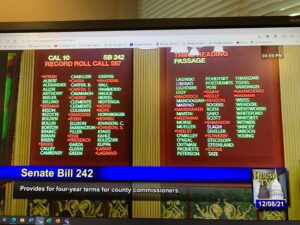
 Actuarial assumptions for local governments with defined benefit plans were released this week by the Michigan Department of Treasury.
Actuarial assumptions for local governments with defined benefit plans were released this week by the Michigan Department of Treasury. MAC joined with other local government groups this week to urge the Legislature to address the consequences of a massive Personal Property Tax exemption which lawmakers rushed through Lansing in a late-night session on Tuesday.
MAC joined with other local government groups this week to urge the Legislature to address the consequences of a massive Personal Property Tax exemption which lawmakers rushed through Lansing in a late-night session on Tuesday. Two MAC-backed bills that create grant programs that would help support local efforts to promote jail diversion and community mobile crisis intervention services cleared the Legislature this week and are on the way to the governor’s desk.
Two MAC-backed bills that create grant programs that would help support local efforts to promote jail diversion and community mobile crisis intervention services cleared the Legislature this week and are on the way to the governor’s desk. A new state council, which will identify, review, develop and recommend policies, administrative actions, legislative changes and other approaches to support high-quality nursing home care, was created this week through Executive Order by Gov. Gretchen Whitmer.
A new state council, which will identify, review, develop and recommend policies, administrative actions, legislative changes and other approaches to support high-quality nursing home care, was created this week through Executive Order by Gov. Gretchen Whitmer. MAC announced this week its office hours for the upcoming holiday break.
MAC announced this week its office hours for the upcoming holiday break.
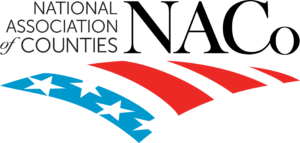 In preparation for the National Association of Counties (NACo)
In preparation for the National Association of Counties (NACo) 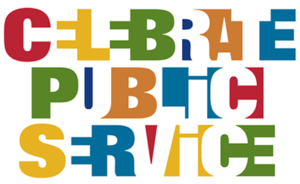 Applications are now open for the National Association of Counties (NACo)
Applications are now open for the National Association of Counties (NACo)  This week, Sen. Bumstead (R-Newaygo) introduced a two-bill package that would provide relief to local governments by reimbursing them for their loss of property tax revenue due to the 2013 legislation granting disabled veterans a property tax exemption.
This week, Sen. Bumstead (R-Newaygo) introduced a two-bill package that would provide relief to local governments by reimbursing them for their loss of property tax revenue due to the 2013 legislation granting disabled veterans a property tax exemption. 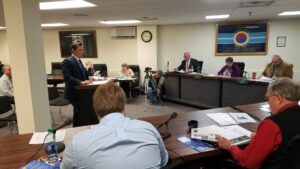 Public meetings in Michigan governed by the state’s Open Meetings Act (OMA) will revert to pre-COVID rules on Jan. 1, 2022. This means that commissioners cannot participate in a county board session as a voting member via electronic means, with only one narrow exception.
Public meetings in Michigan governed by the state’s Open Meetings Act (OMA) will revert to pre-COVID rules on Jan. 1, 2022. This means that commissioners cannot participate in a county board session as a voting member via electronic means, with only one narrow exception.


 The Michigan Department of Health and Human Services (MDHHS) has expanded
The Michigan Department of Health and Human Services (MDHHS) has expanded 




